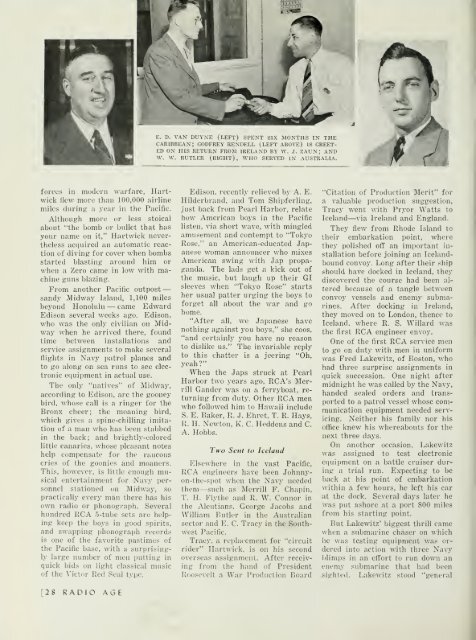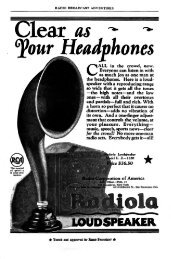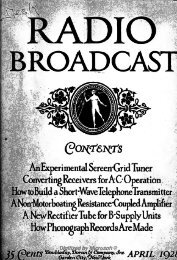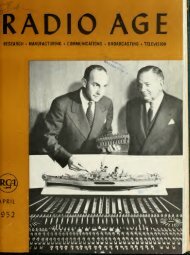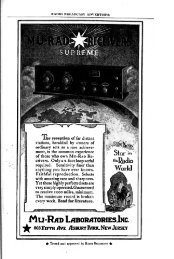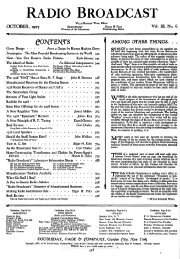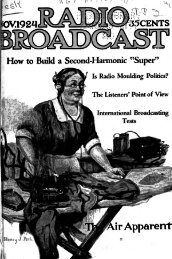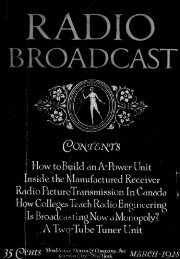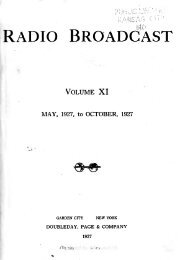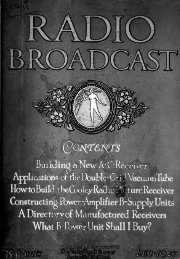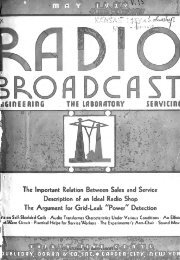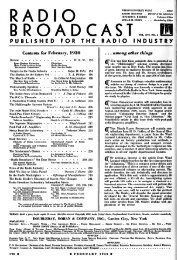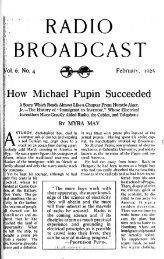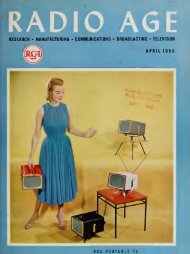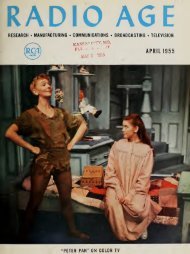Radio Age - 1944, January - 36 Pages, 3.3 MB ... - VacuumTubeEra
Radio Age - 1944, January - 36 Pages, 3.3 MB ... - VacuumTubeEra
Radio Age - 1944, January - 36 Pages, 3.3 MB ... - VacuumTubeEra
You also want an ePaper? Increase the reach of your titles
YUMPU automatically turns print PDFs into web optimized ePapers that Google loves.
K. D. VAN DUYNE (LEFT) SPENT SIX MONTHS IN THE<br />
CARIBBEAN; GODFREY RENDELL (.LEFT ABOVE) IS GREET-<br />
ED ON HIS RETURN FROM IRELAND BY W. J. ZAUN; AND<br />
W. W. BUTLER (RIGHT), WHO SERVED IN AUSTRALIA.<br />
forces in modern warfare, Hartwick<br />
flew more than 100,000 airline<br />
miles during a year in the Pacific.<br />
Although more or less stoical<br />
about "the bomb or bullet that has<br />
your name on it," Hartwick nevertheless<br />
acquired an automatic reaction<br />
of diving for cover when bombs<br />
started blasting around him or<br />
when a Zero came in low with machine<br />
guns blazing.<br />
From another Pacific outpost —<br />
sandy Midway Island, 1,100 miles<br />
beyond -— Honolulu came Edward<br />
Edison several weeks ago. Edison,<br />
who was the only civilian on Midway<br />
when he arrived there, found<br />
time between installations and<br />
service assignments to make several<br />
flights in Navy patrol planes and<br />
to go along on sea runs to see electronic<br />
equipment in actual use.<br />
The only "natives" of Midway,<br />
according to Edison, are the gooney<br />
bird, whose call is a ringer for the<br />
Bronx cheer; the moaning bird,<br />
which gives a spine-chilling imitation<br />
of a man who has been stabbed<br />
in the back; and brightly-colored<br />
little canaries, whose pleasant notes<br />
help compensate for the raucous<br />
cries of the goonies and moaners.<br />
This, however, is little enough musical<br />
entertainment for Navy personnel<br />
stationed on Midway, so<br />
practically every man there has his<br />
own radio or phonograph. Several<br />
hundred RCA 5-tube sets are helping<br />
keep the boys in good spirits,<br />
and swapping phonograi)h records<br />
is one of the favorite pastimes of<br />
the Pacific base, with a surprisingly<br />
large number of men putting in<br />
quick bids on light classical music<br />
of the Victor Red Seal type.<br />
[28 RADIO AGE<br />
Edison, recently relieved by A. E.<br />
Hilderbrand. and Tom Shipferling,<br />
just back from Pearl Harbor, relate<br />
how American boys in the Pacific<br />
listen, via short wave, with mingled<br />
amusement and contempt to "Tokyo<br />
Rose," an American-educated Japanese<br />
woman announcer who mixes<br />
American swing with Jap propaganda.<br />
The lads get a kick out of<br />
the music, but laugh up their GI<br />
sleeves when "Tokyo Rose" starts<br />
her usual patter urging the boys to<br />
forget all about the war and go<br />
home.<br />
"After all, we Japanese have<br />
nothing against you boys," she coos,<br />
"and certainly you have no reason<br />
to dislike us." The invariable reply<br />
to this chatter is a jeering "Oh,<br />
yeah"<br />
When the Japs struck at Pearl<br />
Harbor two years ago, RCA's Merrill<br />
Gander was on a ferryboat, returning<br />
from duty. Other RCA men<br />
who followed him to Hawaii include<br />
S. E. Baker, R. J. Ehret, T. R. Hays,<br />
R. H. Newton, K. C. Heddens and C.<br />
A. Hobbs.<br />
Two Sent to Iceland<br />
Elsewhere in the vast Pacific,<br />
RCA engineers have been Johnnyon-the-spot<br />
when the Navy needed<br />
them—such as Merrill F. Chapin,<br />
T. H. Flythe and R. W. Connor in<br />
the Aleutians, George Jacobs and<br />
William Rutler in the Australian<br />
sector and E. C. Tracy in the Southwest<br />
Pacific.<br />
Tracy, a replacement for "circuit<br />
rider" Hartwick, is on his second<br />
overseas assignment. After receiving<br />
from the hand of President<br />
Roosevelt a War Production Board<br />
"Citation of Production Merit" for<br />
a valuable production suggestion,<br />
Tracy went with Pryor Watts to<br />
Iceland—via Ireland and England.<br />
They flew from Rhode Island to<br />
their embarkation point, where<br />
they polished off an important installation<br />
before joining an Icelandbound<br />
convoy. Long after their ship<br />
should have docked in Iceland, they<br />
discovered the course had been altered<br />
because of a tangle between<br />
convoy vessels and enemy submarines.<br />
After docking in Ireland.<br />
they moved on to London, thence to<br />
Iceland, where R. S. Willard was<br />
the first RCA engineer envoy.<br />
One of the first RCA service men<br />
to go on duty with men in uniform<br />
was Fred Lakewitz, of Boston, who<br />
had three surprise assignments in<br />
quick succession. One night after<br />
midnight he was called by the Navy,<br />
handed sealed orders and transported<br />
to a patrol vessel whose communication<br />
equipment needed servicing.<br />
Neither his family nor his<br />
office knew his whereabouts for the<br />
next three days.<br />
On another occasion, Lakewitz<br />
was assigned to test electronic<br />
equipment on a battle cruiser during<br />
a trial run. Expecting to be<br />
back at his point of embarkation<br />
within a few hours, he left his car<br />
at the dock. Several days later he<br />
was put ashore at a port 800 miles<br />
from his starting point.<br />
But Lakewitz' biggest thrill came<br />
when a submarine chaser on which<br />
he was testing equipment was ordered<br />
into action with three Navy<br />
blimps in an effort to run down an<br />
enemy submarine that had been<br />
sighted. Lakewitz stood "general


